Did Bernanke Prevent Another Great Depression?
Politics / US Economy Apr 22, 2012 - 07:02 AM GMTBy: Frank_Shostak
 In a lecture given at George Washington University on March 27, 2012, the chairman of the Fed said that the US central bank's aggressive response to the 2007–2009 financial crisis and recession helped prevent a worldwide catastrophe. Various economic indicators were showing ominous signs at the time. After closing at 3.1 percent in September 2007, the yearly rate of growth of industrial production fell to minus 14.8 percent by June 2009. The yearly rate of growth of housing starts fell from 20.5 percent in January 2005 to minus 54.8 percent in January 2009.
In a lecture given at George Washington University on March 27, 2012, the chairman of the Fed said that the US central bank's aggressive response to the 2007–2009 financial crisis and recession helped prevent a worldwide catastrophe. Various economic indicators were showing ominous signs at the time. After closing at 3.1 percent in September 2007, the yearly rate of growth of industrial production fell to minus 14.8 percent by June 2009. The yearly rate of growth of housing starts fell from 20.5 percent in January 2005 to minus 54.8 percent in January 2009.
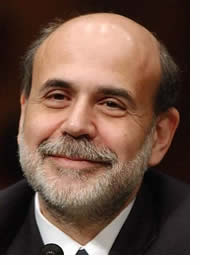
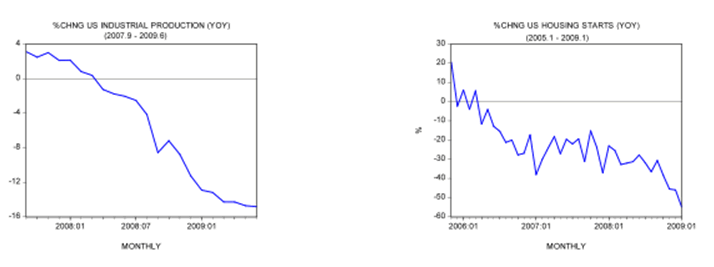
Also, retail sales came under severe pressure — year on year, the rate of growth fell from 5.2 percent in November 2007 to minus 11.5 percent by August 2008. The unemployment rate jumped from 4.4 percent in March 2007 to 10 percent by October 2009. During this period, the number of unemployed people increased from 13.389 million to 15.421 million — an increase of 2.032 million.
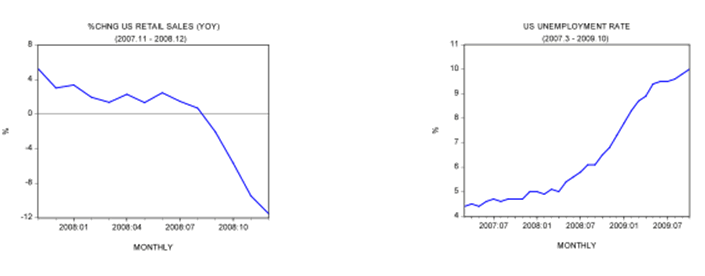
In response to the collapse of the key economic data and a fear of a financial meltdown, the US central bank aggressively pumped money into the banking system. As a result, the Federal Reserve balance sheet jumped from $0.884 trillion in February 2008 to $2.247 trillion in December 2008. The yearly rate of growth of the balance sheet climbed from 1.5 percent in February 2008 to 152.8 percent by December of that year. Additionally the Fed aggressively lowered the federal-funds rate target from 5.25 percent in August 2007 to almost nil by December 2008.
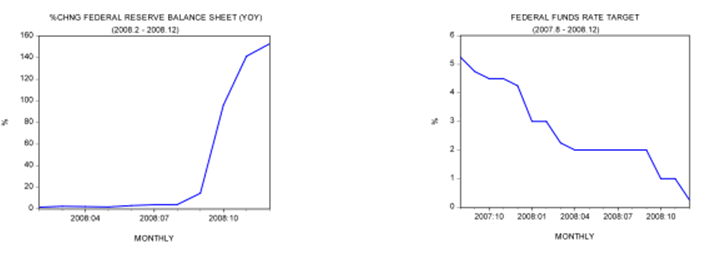
Despite this pumping, the growth momentum of commercial-bank lending had been declining with the yearly rate of growth falling from 11.9 percent in January 2007 to minus 5.3 percent by November 2009. As a result of the fall in the growth momentum of lending, the growth momentum of the money supply would have followed suit if not for the Fed's aggressive pumping to the commercial paper market. This pushed the yearly rate of growth of our measure of US money supply from 1.5 percent in April 2008 to 14.3 percent by August 2009.
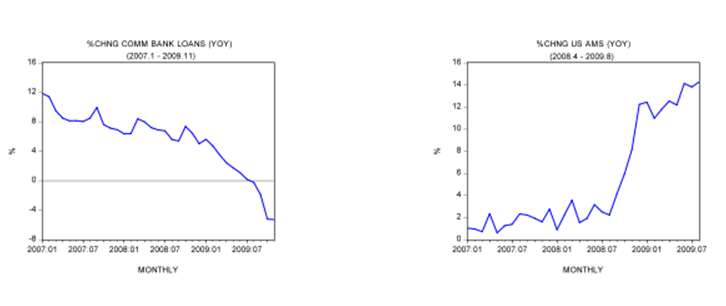
In his speech Bernanke blamed reckless lending in the housing market and financial engineering for the economic crisis. He also acknowledged that the supervision by the Fed was inadequate. According to Bernanke, once the crises emerged the Fed had to act aggressively in order to prevent the crisis from developing into a serious economic disaster. The Fed chairman holds that a highly accommodative monetary policy helps support economic recovery and employment.
We hold that various reckless activities in the housing market couldn't have emerged without the Fed's previous reckless policies. After closing at 6.5 percent in December 2000, the federal-funds rate target was lowered to 1 percent by May 2004. The yearly rate of growth of our monetary measure, AMS, jumped from minus 0.9 percent in December 2000 to 11.5 percent by December 2001. In short, the strong increase in the growth momentum of money supply coupled with an aggressive lowering of interest rates set the platform for various bubble activities, or an economic boom.
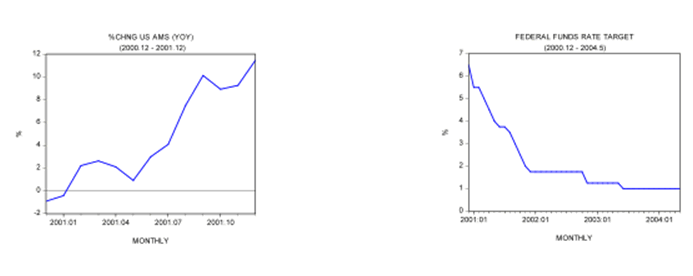
A reversal of the Fed's loose stance put an end to the false boom and put pressure on various bubble activities. The federal-funds-rate target was lifted from 1 percent in May 2004 to 5.25 percent by June 2006. The yearly rate of growth of AMS plunged from 11.5 percent in December 2001 to 0.6 percent in May 2007. As it happened, the effect of this tightening was felt in the housing market first before it spilled over to other bubble sectors. (A tighter monetary stance slowed down the diversion of real savings toward bubble activities from wealth-generating activities.)
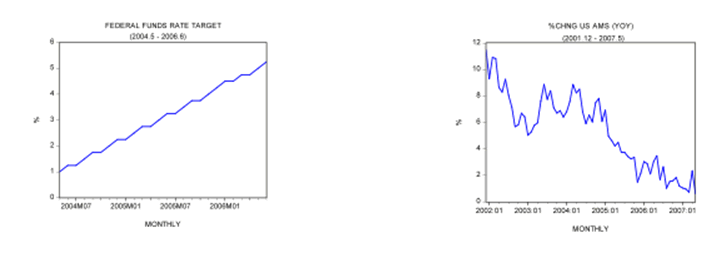
Contrary to Bernanke, we suggest that his loose monetary policy of August 2007 didn't save the US economy but saved various bubble activities that had come under pressure from the previous tighter monetary stance.
Note the loose monetary stance has been aggressively diverting real funding from wealth generators towards bubble activities, thereby weakening the wealth-generation process. The only reason why loose monetary policy supposedly "revived" the economy is because there are still enough wealth generators to support the Fed's reckless policy. Also, note that all the gains from the previous tighter stance have now been wasted to support bubble activities.
As long as the pool of real savings is still growing, Fed policy makers can get away with the illusion that they have saved the US and the world economies. Once the pool of real savings starts stagnating, or worse, declining, the illusory nature of the Fed's policy will be revealed — note that the economy follows the state of the pool of real savings. Any aggressive monetary policy in this case is going to make things much worse.
The actions of Bernanke to revive the economy run contrary to the basic principles of running a company. For instance, in a company of 10 departments, 8 departments are making profits and the other 2 losses. A responsible CEO will shut down or restructure the 2 departments that make losses — failing to do so will divert funding from wealth generators toward loss-making departments, thus weakening the foundation of the entire company. Without the removal or restructuring of the loss-making departments, there is the risk that the entire company could eventually go belly up. So why then should a CEO who decides to support nonprofitable activities be regarded as a failure when Bernanke and his central-bank colleagues are seen as heroes who saved the economy?
Bernanke is of the view that by pumping money he has provided the necessary liquidity to keep the financial system going. We suggest that this is false. What permits the financial sector to push ahead is real savings. The financial sector does not have a life of its own; its only role is to facilitate the real wealth that was generated by the wealth producers. Remember that banks are just intermediaries; they facilitate real savings across the economy by means of money (the medium of exchange).
By flooding the banking system with money, one doesn't create more real savings but, on the contrary, depletes the pool of real funding. Most commentators are of the view that in some cases when there is a threat of serious damage to the financial system the central bank should intervene to prevent the calamity, and this is precisely what Bernanke's Fed did.
We suggest the severe threat here is to various bubble activities that must be removed in order to allow wealth generators to get on with the job of creating wealth. If a lot of bubbles must disappear, so be it. Any policy to support bubbles, be it large banks or other institutions, will only make things much worse. As we have seen, if the pool of real savings is not there, a central-bank policy to prop up bubbles will make things much worse. After all, the Fed cannot generate real wealth.
Bernanke's policy — which amounts to the protection of inefficiency, i.e., bubble activities — runs the risk of generating a prolonged slump with occasional rallies in the data. It could be something similar to the situation in Japan (which Bernanke has in the past criticized).
Summary and Conclusion
We can conclude that, contrary to Bernanke, his loose policies didn't save the US economy from a depression but have instead damaged the process of real wealth generation.
Bernanke's loose policies have provided support to bubble activities, thereby destabilizing the economy. So in this sense his policies have saved the bubbles, thus undermining wealth generators.
We suggest that the more forceful the Fed's response to various economic indicators is, the more damage this does to the pool of real savings. This runs the risk that at some stage the United States could end up having a stagnating or worse, declining, pool of real savings.
If this were to occur, then we could end up of having a severe economic slump. If anyone needs examples in this regard, have a look at countries such as Greece, Spain, and Portugal.
Over a prolonged period of time the policies of these countries (an ever-growing government and central-bank involvement in the economy) have severely damaged the heart of economic growth — the pool of real savings.
Again, if the pool of real savings is to become stagnant, or worse, starts declining, any attempt by the Fed to make things better is going to make things actually much worse by depleting the pool of real savings or funding further. If the pool of real funding is stagnating, then no matter how much pumping the Fed does, banks will not be able to lift lending. Remember: without expanding real funding any expansion in credit could lead to financial disaster.
Frank Shostak is an adjunct scholar of the Mises Institute and a frequent contributor to Mises.org. He is chief economist of M.F. Global. Send him mail. See Frank Shostak's article archives. Comment on the blog.![]()
© 2012 Copyright Frank Shostak - All Rights Reserved Disclaimer: The above is a matter of opinion provided for general information purposes only and is not intended as investment advice. Information and analysis above are derived from sources and utilising methods believed to be reliable, but we cannot accept responsibility for any losses you may incur as a result of this analysis. Individuals should consult with their personal financial advisors.
© 2005-2022 http://www.MarketOracle.co.uk - The Market Oracle is a FREE Daily Financial Markets Analysis & Forecasting online publication.



